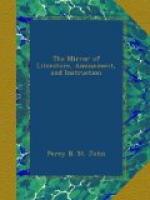* * * * *
SPIRIT OF THE PUBLIC JOURNALS.
* * * * *
NOTES FROM THE LONDON REVIEW,
NO. 1.
ANCIENT AND MODERN LUXURIES.
As a learned doctor, a passionate admirer of the Nicotian plant, was not long since regaling himself with a pinch of snuff, in the study of an old college friend, his classical recollections suddenly mixed with his present sensation, and suggested the following question:—“If a Greek or a Roman were to rise from the grave, how would you explain to him the three successive enjoyments which we have had to-day after dinner,—tea, coffee, and snuff? By what perception or sensation familiar to them, would you account for the modern use of the three vulgar elements, which we see notified on every huckster’s stall?—or paint the more refined beatitude of a young barrister comfortably niched in one of our London divans, concentrating his ruminations over a new Quarterly, by the aid of a highly-flavoured Havannah?” The doctor’s friend, whose ingenuity is not easily taken at fault, answered, “By friction, which was performed so consummately in their baths. It is no new propensity of animal nature, to find pleasure from the combination of a stimulant, and a sedative. The ancients chafed their skins, and we chafe our stomachs, exactly for that same double purpose of excitement and repose (let physiologists explain their union) which these vegetable substances procure now so extensively to mankind. In a word, I would tell the ancient Greeks or Romans, that the dealer in tea, coffee, tobacco, and snuff, is to us what the experienced practioner of the strigil was to them; with this difference, however, that while we spare our skins, our stomachs are in danger of being tanned into leather.”
* * * * *
THE STAGE.
We may compare tragedy to a martyrdom by one of the old masters; which, whatever be its merit, represents persons, emotions, and events so remote from the experience of the spectator, that he feels the grounds of his approbation and blame to be in a great measure conjectural. The romance, such as we generally have seen it, resembles a Gothic window-piece, where monarchs and bishops exhibit the symbols of their dignity, and saints hold out their palm branches, and grotesque monsters in blue and gold pursue one another through the intricacies of a never-ending scroll, splendid in colouring, but childish in composition, and imitating nothing in nature but a mass of drapery and jewels thrown over the commonest outlines of the human figure. The works of the comedian, in their least interesting forms, are Dutch paintings and caricatures: in their best, they are like Wilkie’s earlier pictures, accurate imitations of pleasing, but familiar objects—admirable as works of art, but addressed rather to the judgment than to the imagination.




